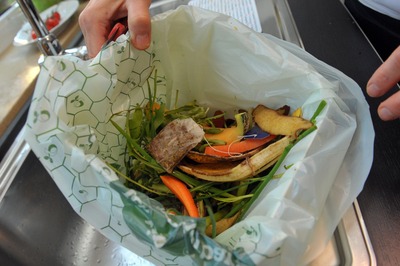Pilot project, with compostable bags for biodegradable waste, successful
Friday, 11 May, 2012
Municipal waste management company Berliner Stadtreinigung (BSR) and chemical company BASF have successfully completed a joint pilot project involving the use of organic waste bags made of the biodegradable plastic Ecovio FS. The bio-based bags meet European standard EN 13432 for compostable plastics and, in accordance with the amendment to the German Organic Waste Regulations at the end of 2011, they can be used to collect organic waste.

The bags are intended to make the disposal of biodegradable garbage cleaner, more hygienic and less complicated. Not only do they prevent odours and keep out insects, but this also means that it is no longer necessary to wash and clean the container in which the organic waste is collected. The air-permeable bags ensure that the organic waste dries and smells less than it does in conventional bags. Consequently, the Ecovio bags are easier to handle since they do not have to be taken out of the kitchen every day.
In September 2011, more than 21,000 households in the districts of Prenzlauer Berg and Hellersdorf each received a test package with 10 organic waste bags. Each participating household received the test package with the organic waste bags made of BASF’s biodegradable and compostable plastic Ecovio FS by bulk mail together with information material, free of charge. Moreover, 3700 households in Hellersdorf were additionally given a pre-sorting kitchen container to make it easier to collect organic waste. The residents were asked to use the bags to collect their organic waste in the following three months.
According to a survey by the University of Mannheim, which had already conducted the analysis of a previous project, almost 80% of residents in both of these Berlin districts were satisfied or very satisfied with the new organic waste bags. Previously, almost 30% of those surveyed had not regularly separated their organic garbage because of the dirty collecting containers, while 23% had not done so because of the unpleasant odour.
Incorrect disposal, ie, the number of conventional, non-biodegradable bags that ended up in the organic waste bins, fell sharply during the trial. In Prenzlauer Berg, incorrect disposal fell by 37% and in Hellersdorf by as much as 67%. Meanwhile, the amount of organic waste collected during the project increased by about 10% in the fourth quarter of 2011. This rise ran counter to the normal seasonal trend: during the same time span, the quantity of organic waste in other districts of Berlin fell by 20%.
“For us, it was crucial that the residents accepted the bags, that incorrect disposal decreased and that organic waste collection was more convenient for the residents. A higher level of acceptance for organic waste collection also contributes to increasing the volumes of separated waste,” said Frieder Söling of BSR.
The Kanthak & Adam engineering office, a consulting firm for projects involving waste management in Berlin that looked into the quality of the organic waste and of the compost, drew a positive interim balance: “After two-thirds of the composting time, the bags made of Ecovio FS had degraded in the composting plant and did not adversely affect the quality of the compost,” said Manfred Kanthak of Kanthak & Adam.
Keeping the line moving
Selecting the right conveyor drive system requires a clear understanding of how different...
Green chemistry approach to extract value from plant waste
A new enzyme could be the key to extracting high-value molecules from lignin using a green...
Vegetable oil waste sees new life through WORLD project
The Politecnico di Milano proposes a circular and sustainable process to turn used vegetable oil...










